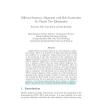Free Online Productivity Tools
i2Speak
i2Symbol
i2OCR
iTex2Img
iWeb2Print
iWeb2Shot
i2Type
iPdf2Split
iPdf2Merge
i2Bopomofo
i2Arabic
i2Style
i2Image
i2PDF
iLatex2Rtf
Sci2ools
128
click to vote
CONSTRAINTS
2008
2008
Efficient Sequence Alignment with Side-Constraints by Cluster Tree Elimination
Aligning DNA and protein sequences is a core technique in molecular biology. Often, it is desirable to include partial prior knowledge and conditions in an alignment. Going beyond prior work, we aim at the integration of such side constraints in free combination into alignment algorithms. The most common and successful technique for efficient alignment algorithms is dynamic programming (DP). However, a weakness of DP is that one cannot include additional constraints without specifically tailoring a new DP algorithm. Here, we discuss a declarative approach that is based on constraint techniques and show how it can be extended by formulating additional knowledge as constraints. We take special care to obtain the efficiency of DP for sequence alignment. This is achieved by careful modeling and applying proper solving strategies. Finally, we apply our method to the scanning for RNA motifs in large sequences. This case study demonstrates how the new approach can be used in real biological ...
Related Content
| Added | 09 Dec 2010 |
| Updated | 09 Dec 2010 |
| Type | Journal |
| Year | 2008 |
| Where | CONSTRAINTS |
| Authors | Sebastian Will, Anke Busch, Rolf Backofen |
Comments (0)

